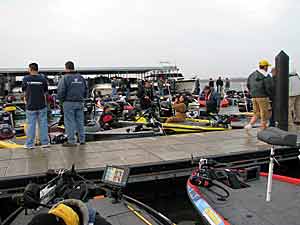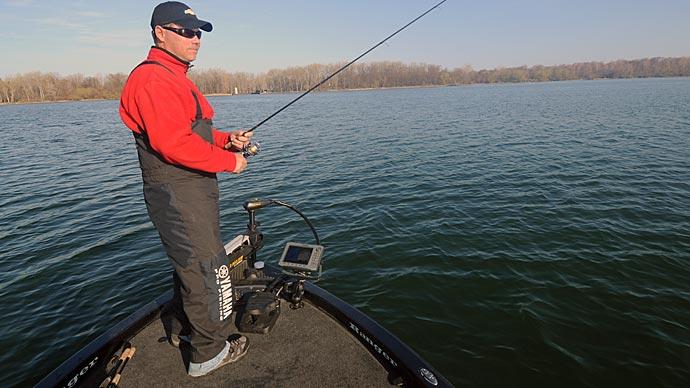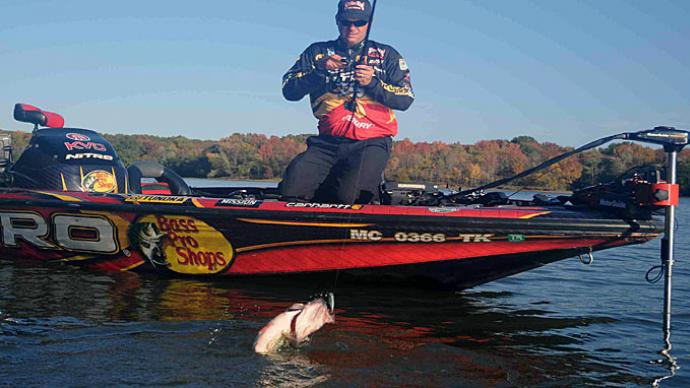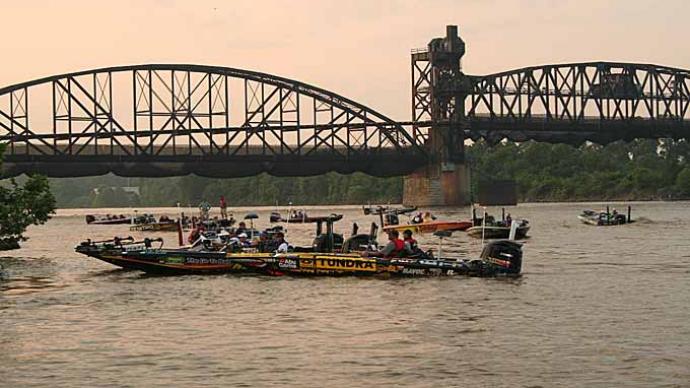
Tournament fishing and fun fishing are two very different ball games. It's not that I didn't have "fun" fishing tournaments, but it was business. And to succeed in the tournament business required one thing: consistency.
While my tournament record contains some individual wins that I'm proud of, I am still content that my greatest accomplishment is revealed in the number of times I finished "in the money."
From the day I started fishing B.A.S.S. fishing tournaments until the day I retired, I was blessed to finish in the money 76% of the time.
The reason I hold this accomplishment above the rest, is that it reflects consistency. Few pros have been as consistent, and friends, I believe consistency is vital if your goal is to win tournaments.
Put simply, if you are consistent, the wins will come.
Early in my career, I recognized that consistency was directly related to my ability to read the water and discern the appropriate patterns successfully. To constantly improve, I dedicated myself to analyzing my past tournaments and applying those "lessons learned" to future tournaments. This led to an exciting discovery: my best tournaments resulted from becoming "married" to a small area of the lake.
It turned out that running from one end of the lake to the other wasn't nearly as productive for me as when I married a small area - such as a creek, cove, or bay. The majority of my wins resulted from getting to my fishing spot, dropping the trolling motor, and then not picking it up again until weigh-in time. Staying in that small area inevitably gave me the most consistency and kept me "in the money" three out of four times.
Naturally, what worked for me doesn't work for every tournament fisherman. No two anglers are the same. What's important to stress here is that we each have to find our personal strengths - the unique gifts that will lead us to do our very best. It is essential to discover our personal style, methods, and philosophy of fishing - and then fine-tune it over time.
A common mistake among tournament anglers is forcing the fish to do what you want. Instead, the key is to accurately read the water, and then fish your strengths in a way that enables the fish to reveal what they are doing. This places the fisherman in a much better position to be productive. Let me give you an illustration.
When fishing in a lake with clear and muddy water, a clear-water fisherman is better served if they run to the lower end of the lake, near the dam, and fish their strengths in clear water. A muddy-water angler might run to the upper end of the lake to find the dirty water that best suits their method, technique, and style of fishing.
That fact seems so simple to me now, but I assure you it was just one of many lessons I had to learn fishing tournaments - and a few of those lessons came the hard way.
I remember sitting and talking with Ray Scott after our tournament on the Potomac River had been canceled because of Hurricane Hugo. He had been suggesting that the first angler to win the Grand Slam would become one of the most famous anglers of all time.
When I asked him to explain what the Grand Slam was, he shared it was an honor presented to the winner of four major events and awards: the Bassmaster Classic, the qualifying tournament, a Super Tournament, and the Angler of the Year.
Discovering that no angler had ever won all four, I set my sites on this new goal. I had previously won three of the four, but never a Super Tournament. That year, it was located on Lake Lanier in Georgia. As it turned out, the first three days of the tournament were dominated by Gary Klein.
By the fourth and final day, I had remained consistent and was coming on strong. That day, I was able to come to the weigh-in with a giant stringer of fish, the largest of the tournament.
Ray said, "Hold those fish up. Let everyone see them, and give the audience a chance to take some pictures!" So I did - for quite some time. Finally, we weighed them.
When Gary Klein came to the scales, it had just started to rain, so Ray said, "Bring those fish on up here, and let's not waste any time. Let's put them on the scales and see what we've got." Gary won that tournament by one ounce.
I learned a painful lesson that day: never hold your fish up until after you weigh them. I can't prove it, but there is no doubt in my mind, that I would have won that tournament had I put those bass directly on the scales and not held them up. That was a painful lesson.
But I would benefit from that lesson five years later in the Bassmaster Classic. In a similar scenario, I found myself in a shootout with Jim Bitter. Again, I came in with the biggest stringer of the tournament on the last day. And at the weigh-in, Ray Scott said, "Hold them up."
This time, I said, "No, I won't hold them up. Put them on the scale."
Always a showman, Ray insisted, "No, it will be more dramatic if you hold them up. Let's build some real drama here."
I said, "No, I'm not worried about drama. Put them on the scales, and then I'll hold them up." Reluctantly, Ray had the bass placed on the scales, and I won the Bassmaster Classic by two ounces.
Had I not learned a painful lesson in the earlier Super Tournament on Lake Lanier, I might have made the same mistake at the Bassmaster Classic. Thankfully, I remembered that first lesson, and in hindsight, the Classic turned out to be a lot more important and lucrative in the long run.
A painful lesson can become a great lesson if you learn from it. When you successfully apply that lesson to future events, sometimes it pays great dividends.
And by the way, I got another chance to take a crack at the Grand Slam the very next year on the St. John River in Florida. I won that Super Tournament and was blessed to be the first to win the Grand Slam.
Fishing tournaments are exciting, but they always come with some painful lessons attached. It's incredible to live a dream, but you will also have to learn as you go. As I discovered, experiencing painful lessons is essential to personal growth in this sport.
Now that my son, Ben, is fishing tournaments, I caution him against another temptation common to beginners: being heavily influenced by tournament talk. "Oh man, this guy caught 30 pounds yesterday fishing 28 feet deep."
If you have been fishing a spinnerbait in the shallows, you can easily be distracted from fishing your strengths if you listen to all the shop talk. Unfortunately, some anglers do it just to psyche out their competition.
But remember, there was a reason old-time farmers used to put blinders on their mules when plowing: to prevent distractions, and to keep the mule focused on going straight ahead rather than wandering all over the field.
Likewise, if you are a tournament angler, you must wear earmuffs to prevent shoptalk distractions from influencing how you approach your tournament plan.
My experience taught me it was better not to care what everyone else was saying or doing. I needed to stay faithful to how I'd learned to read the water. Leaning on my strengths, it was my job to discern what the fish were doing on that particular lake. It was up to me, not others, to figure out the correct pattern, and then bring those fish to the scales.
There's an adage that says, "A smart man makes mistakes and learns from them. But a wise man learns from a smart man's mistakes, to never make them."
Whenever you can, be a wise fisherman and learn from other angler's mistakes - don't go out on the lake and chase everybody else's patterns. To the best of your ability, lean on your own personal experiences and unique strengths to put together your own patterns.
If you fish tournaments, don't let other competitors distract or confuse you. If you stick with your plan, work hard, fish hard, and set your goal towards developing consistency, you will eventually get the job done.
For more articles, quick tips, and much more, visit HankParker.com.




